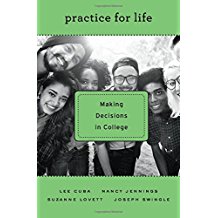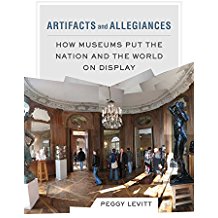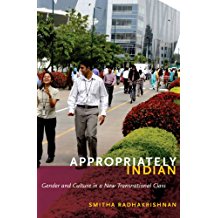Read the Sociology Department’s Commitment to Inclusivity (July 2020)

The function of sociology, as of every science,
is to reveal that which is hidden.
- Pierre Bourdieu (1930-2002)
To study sociology is, in the best tradition of the liberal arts, to free oneself to explore the familiar anew – to make the familiar unfamiliar – and by so doing enrich ourselves and those around us.
At my college, you had to write a junior paper and a senior thesis, so I knew that I needed a topic that I would want to write more than 100 pages about. So I was interested in the study of people and human behavior. That was something that interested me. And it was also good because I knew if I wanted to go to law school, I'd need to get good grades. And to get good grades, I'd have to study something I cared about instead of something people thought I should study. And it worked.
- Michelle Obama, Sociology major (B.A., Princeton)
Books by our faculty:
 |
Lee Cuba and Joe Swingle From the day they arrive on campus, college students spend four years - or sometimes more - making decisions that shape every aspect of their academic and social lives. Whether choosing a major or a roommate, some students embrace decision-making as an opportunity for growth, while others seek to minimize challenges and avoid risk. Practice for Life builds a compelling case that a liberal arts education offers students a complex, valuable process of self-creation, one that begins in college but continues far beyond graduation. |
 |
Thomas Cushman A peculiar and fascinating aspect of many responses to mass atrocities is the creative and eclectic use of religious language and frameworks. Some crimes are so extreme that they "cry out to heaven," drawing people to employ religious vocabulary to make meaning of and to judge what happened, to deal with questions of guilt and responsibility, and to re-establish hope and trust in their lives. Moreover, in recent years, religious actors have become increasingly influential in worldwide contexts of conflict-resolution and transitional justice. This collection offers a critical assessment of the possibilities and problems pertaining to attempts to bring religious - or semi-religious - allegiances and perspectives to bear in responses to the mass atrocities of our time: When and how can religious language or religious beliefs and practices be either necessary or helpful? And what are the problems and reasons for caution or critique? In this book, a group of distinguished scholars explore these questions and offer a range of original explanatory and normative perspectives.
|
 |
Thomas Cushman In mapping out the field of human rights for those studying and researching within both humanities and social science disciplines, the Handbook of Human Rights not only provides a solid foundation for the reader who wants to learn the basic parameters of the field, but also promotes new thinking and frameworks for the study of human rights in the twenty-first century. The Handbook comprises over sixty individual contributions from key figures around the world. In its presentation and analysis of the traditional core history and topics, critical perspectives, human rights culture, and current practice, this Handbook proves a valuable resource for all students and researchers with an interest in human rights.
|
 |
Jonathan Imber For more than a century, the American medical profession insisted that doctors be rigorously trained in medical science and dedicated to professional ethics. Patients revered their doctors as representatives of a sacred vocation. Do we still trust doctors with the same conviction? In Trusting Doctors, Jonathan Imber attributes the development of patients' faith in doctors to the inspiration and influence of Protestant and Catholic clergymen during the nineteenth and early twentieth centuries. He explains that as the influence of clergymen waned, and as reliance on medical technology increased, patients' trust in doctors steadily declined. Trusting Doctors provides valuable insights into the religious underpinnings of the doctor-patient relationship and raises critical questions about the ultimate place of the medical profession in American life and culture. |
 |
Peggy Levitt What can we learn about nationalism by looking at a country’s cultural institutions? How do the history and culture of particular cities help explain how museums represent diversity? Artifacts and Allegiances takes us around the world to tell the compelling story of how museums today are making sense of immigration and globalization. Based on firsthand conversations with museum directors, curators, and policymakers; descriptions of current and future exhibitions; and inside stories about the famous paintings and iconic objects that define collections across the globe, this work provides a close-up view of how different kinds of institutions balance nationalism and cosmopolitanism. By comparing museums in Europe, the United States, Asia, and the Middle East, Peggy Levitt offers a fresh perspective on the role of the museum in shaping citizens. Taken together, these accounts tell the fascinating story of a sea change underway in the museum world at large. |
|
Smitha Radhakrishnan In Making Women Pay, Prof Radhakrishnan explores India's microfinance industry, which in the past two decades has come to saturate the everyday lives of women in the name of state-led efforts to promote financial inclusion and women's empowerment. Despite this favorable language, Prof Radhakrishnan argues, microfinance in India does not provide a market-oriented development intervention, even though it may appear to help women borrowers. Rather, this commercial industry seeks to extract the maximum value from its customers through exploitative relationships that benefit especially class-privileged men. Through ethnography, interviews, and historical analysis, Prof Radhakrishnan demonstrates how the unpaid and underpaid labor of marginalized women borrowers ensures both profitability and symbolic legitimacy for microfinance institutions, their employees, and their leaders. In doing so, she centralizes gender in the study of microfinance, reveals why most microfinance programs target women, and explores the exploitative implications of this targeting. |
|
 |
Smitha Radhakrishnan Appropriately Indian is an ethnographic analysis of the class of information technology professionals at the symbolic helm of globalizing India. Comprising a small but prestigious segment of India’s labor force, these transnational knowledge workers dominate the country’s economic and cultural scene, as do their notions of what it means to be Indian. Drawing on the stories of Indian professionals in Mumbai, Bangalore, Silicon Valley, and South Africa, Smitha Radhakrishnan explains how these high-tech workers create a “global Indianness” by transforming the diversity of Indian cultural practices into a generic, mobile set of “Indian” norms. Female information technology professionals are particularly influential. By reconfiguring notions of respectable femininity and the “good” Indian family, they are reshaping ideas about what it means to be Indian. |
 |
Markella Rutherford Adult Supervision Required considers the contradictory ways in which contemporary American culture has imagined individual autonomy for parents and children. In many ways, today’s parents and children have more freedom than ever before. There is widespread respect for children’s autonomy as distinct individuals, and a broad range of parenting styles are flourishing. Yet it may also be fair to say that there is an unprecedented fear of children’s and parents’ freedom. Dread about Amber Alerts and “stranger danger” have put an end to the unsupervised outdoor play enjoyed by earlier generations of suburban kids. Similarly, fear of bad parenting has not only given rise to a cottage industry of advice books for anxious parents, but has also granted state agencies greater power to police the family. |
